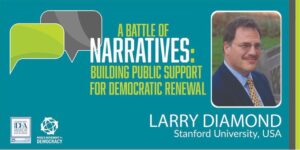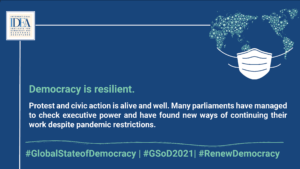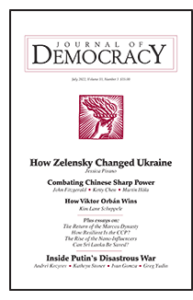The world can’t wait for us to counter Russian and Chinese disinformation, support democratic struggles abroad, stabilize and improve democratic institutions, and forge partnerships between democratic organizations and actors, says Stanford’s Larry Diamond.
While not advocating a return to the Cold War, “we definitely must confront and try to dismantle or obstruct their efforts to project global sharp power and global hard power to undermine democracies around the world,” he tells the Democracy Paradox podcast:
 So, if that’s what you mean by containment: to contain, preempt, obstruct, frustrate their plans and resolve to try to weaken, intimidate, conquer, compromise, and destabilize democracies around the world. Definitely. I think that should be our leading objective. I think we must meet them on the normative informational and the ideological battlefields to join with individuals from their countries and neighboring countries to fight for democratic values and principles…
So, if that’s what you mean by containment: to contain, preempt, obstruct, frustrate their plans and resolve to try to weaken, intimidate, conquer, compromise, and destabilize democracies around the world. Definitely. I think that should be our leading objective. I think we must meet them on the normative informational and the ideological battlefields to join with individuals from their countries and neighboring countries to fight for democratic values and principles…
The essential elements for a functioning and inclusive democracy are a vibrant civil society and robust civic space. However, across the world, especially in the Global South, we’re witnessing a concerning rise in authoritarianism and a compounding decrease in democratic values that, together, are deepening inequality, the Ford Foundation’s Darren Walker writes.
Strategic relevance
 Without robust civic space, there is no place for engagement and voice, and people who live on the margins are systematically excluded from the decisions that affect them most, he adds, announcing Weaving Resilience, an $80 million initiative to address three central challenges facing civil society: institutional resilience, strategic relevance, and holistic well-being.
Without robust civic space, there is no place for engagement and voice, and people who live on the margins are systematically excluded from the decisions that affect them most, he adds, announcing Weaving Resilience, an $80 million initiative to address three central challenges facing civil society: institutional resilience, strategic relevance, and holistic well-being.
“The trajectory has been discernibly negative,” says Christopher Walker, vice president of studies and analysis at the National Endowment for Democracy, who believes philanthropy could play a critical role in reversing the tide.
“Philanthropy may be positioned to stimulate innovation in ways that other resources might not be able to, he added, “especially when the challenges and the threats are growing and changing at such a fast pace.”
History has shown that the arc of human civilization does not inevitably bend toward liberal democracy, The Times’s Spencer Bokat-Lindell adds. But its tendency toward autocracy is also highly contingent. In The Washington Post, International IDEA’s Miguel Angel Lara Otaola noted that since 2000, even as democratic backsliding became the predominant global trend, nine countries managed to transition back to democracy after a period of authoritarianism. “These countries show us that democracy is resilient and that countries can and do return to democracy,” he wrote.
 We can’t view democratic dialog and partnerships as a one-way street, adds Diamond, founding co-editor of the Journal of Democracy:
We can’t view democratic dialog and partnerships as a one-way street, adds Diamond, founding co-editor of the Journal of Democracy:
We can learn, we can gain, we can get new ideas and we can get inspiration and new hope and strength from our partnership with democratic actors around the world. It’s a two-way street and innovation does not only happen in the United States.
There’s a lot of democratic innovation and imagination about new forms of participation, new ways of enriching democracy, new ways of framing the value of democracy that emerge from abroad. RTWT
Can democratic dysfunction be attributed to citizen complacency?
“A lot of people grew up with the benefits of liberal democracy, in societies that were peaceful and prosperous, and have come to take it for granted,” says Stanford’s Francis Fukuyama. “There’s a famous assertion that politics is downstream of culture, and culture is downstream of ideas,” he adds. “If you don’t have the ideas out there, you’re not going to change the culture. And if you don’t change the culture, you’re not going to change the politics.”







